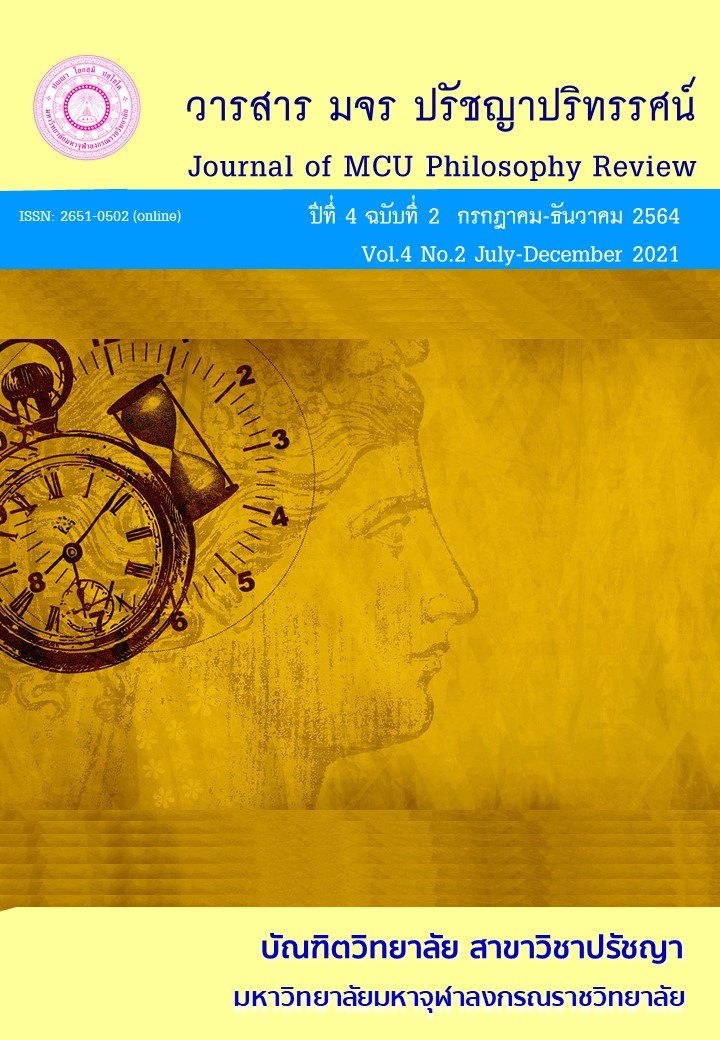The learned achievement and satisfaction gained from the transformation of the classroom to the philosophical investigative learning room: A case study of the subject on Seminar in Tourism and Hospitality Management Course
Main Article Content
Abstract
This article entitled to study the process of teaching and learning Seminars in tourism and Hospitality management Course in the first semester of the academic year 2020. The population group is 10 students in the Department of Tourism and Hospitality Management, Year 4, Faculty of Business Administration. North - Chiang Mai University. The tools used in the research were quizzes, observational (qualitative), worksheets and assessment forms. The statistics used in the data analysis were percentage, mean, and Dependent Sample t-test. The outstanding findings from the observations are: Every time students organize activities for group discussions with the form. Turning the classroom into a thinking room with philosophical inquiry all students participate develop questioning skills better thinking sequentially. All students can plan events and organize academic Seminars. Tourism and Hospitality correctly and excellently. The findings also reflect that the teaching-learning process of thinking classroom with philosophical inquiry resulted in better scores for all students. With an average score of 9.00 standard deviation was 0.82 and when comparing the scores before and after study, it was found that the students' test scores after school were significantly higher than before at the 0.05 level (t = 28.15, sig. = 0.000) And the satisfaction assessment results found that the average level of satisfaction of students for the Seminars in tourism and Hospitality management Course are at a high level. And the satisfaction level of the students who had a learning of thinking classroom with philosophical inquiry was at the highest level.
Article Details
บทความที่ได้รับการตีพิมพ์เป็นลิขสิทธิ์ของวารสาร มจร ปรัชญาปริทรรศน์
ข้อความในบทความที่ได้รับการตีพิมพ์ในวารสาร ถือเป็นความรับผิดชอบของผู้เขียนบทความ และข้อคิดเห็นนั้นไม่ถือว่าเป็นทัศนะและความรับผิดชอบของกองบรรณาธิการวารสาร มจร ปรัชญาปริทรรศน์
References
กระทรวงศึกษาธิการ. (2546). พระราชบัญญัติการศึกษาแห่งชาติพุทธศักราช 2542 แก้ไขเพิ่มเติม (ฉบับที่ 2) พุทธศักราช2545. กรุงเทพมหานคร: คุรุสภากรุงเทพฯ.
เกษฎา ผาทอง, วรวลัญช์ โรจนพล. (2562). กระบวนทัศน์การแสวงหาความรู้สู่การวิจัย. วารสารวิชาการมหาวิทยาลัยราชภัฎภูเก็ต 15(1), 25-43.
เฉลิมวุฒิ ศุภสุข. (2563). การใช้กระบวนการเรียนรู้เชิงรุกร่วมกับเทคนิคการใช้คําถามเพื่อเสริมสร้างความสามารถในการตั้งคําถามโครงงานวิทยาศาสตร์ของนักศึกษาสาขาวิชาวิทยาศาสตร์ทั่วไปคณะครุศาสตร์ มหาวิทยาลัยราชภัฏร้อยเอ็ด. วารสารมหาวิทยาลัยราชภัฎร้อยเอ็ด 14(3), 17-32.
ชลธิชา รุ่งสาตรา, ณัฐสุดา ผาลา. (2561). ผลสัมฤทธิ์จากการเปลี่ยนห้องเรียนให้เป็นห้องคิดด้วยการสืบถามเชิงปรัชญารายวิชา 500206 การสื่อสารข้ามวัฒนธรรมในงานบริการ. วารสารปัญญา 25(2), 67-85.
บรรจง อมรชีวิน. (2556). เปลี่ยนห้องเรียนให้เป็นห้องคิดด้วยการสืบถามเชิงปรัชญา. กรุงเทพมหานคร: หจก.ภาพพิมพ์.
เผชิญ กิจระการ. (2544). การวิเคราะห์ประสิทธิภาพสื่อและเทคโนโลยีเพื่อการศึกษา E1/ E2. วารสารการวัดผลการศึกษามหาวิทยาลัยมหาสารคาม 7(2), 44-52.
A.P.Martinich. (1996). Philosophical Writing: An Introduction. 2nd edition. Oxford: Blackwell Publishers.
Peter Liljedahl. (2017). Building a Thinking Classroom in Math. สืบค้นเมื่อวันที่ 17 ตุลาคม2017, จาก https://www.edutopia.org/article/building-thinking-classroom-math.


